Blind Women’s Real Menstrual Challenges: Accessibility & Period Struggles Explained
🍄 Blogger @末路蘑菇 reveals a startling reality: “Women with visual impairments account for 55% of the blind population. Among them, 96% use sanitary pads during menstruation, yet 53% change pads fewer than four times daily.” Prolonged use of unhygienic pads and poor menstrual management make these women particularly vulnerable to gynecological diseases.
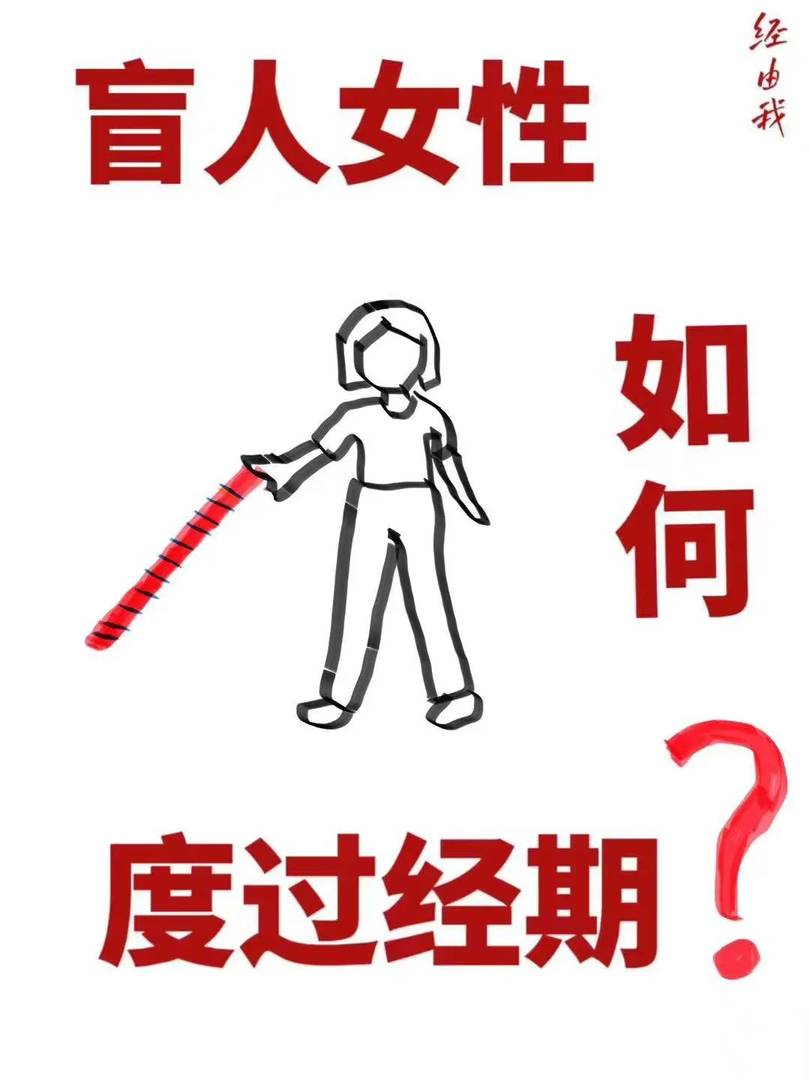
But how do visually impaired women detect their periods? With no braille-labeled pads currently available, how do they navigate this monthly challenge?
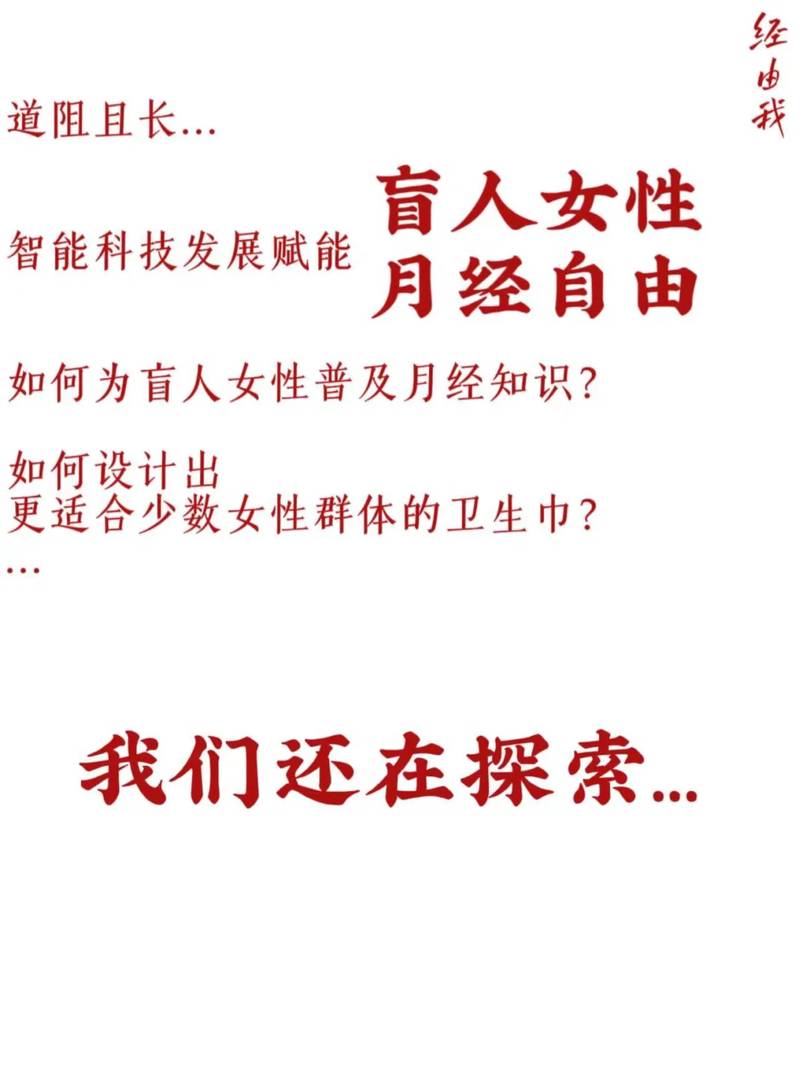
👩🦯 Blogger @心智互动 responds with insightful answers:
1⃣ Distinguishing pad orientation – Through tactile sensitivity, blind women can easily identify front/back and length differences.
2⃣ Mastering pad application – With practice, they achieve proper placement. Leakage risks, common to all women, stem from multiple factors.
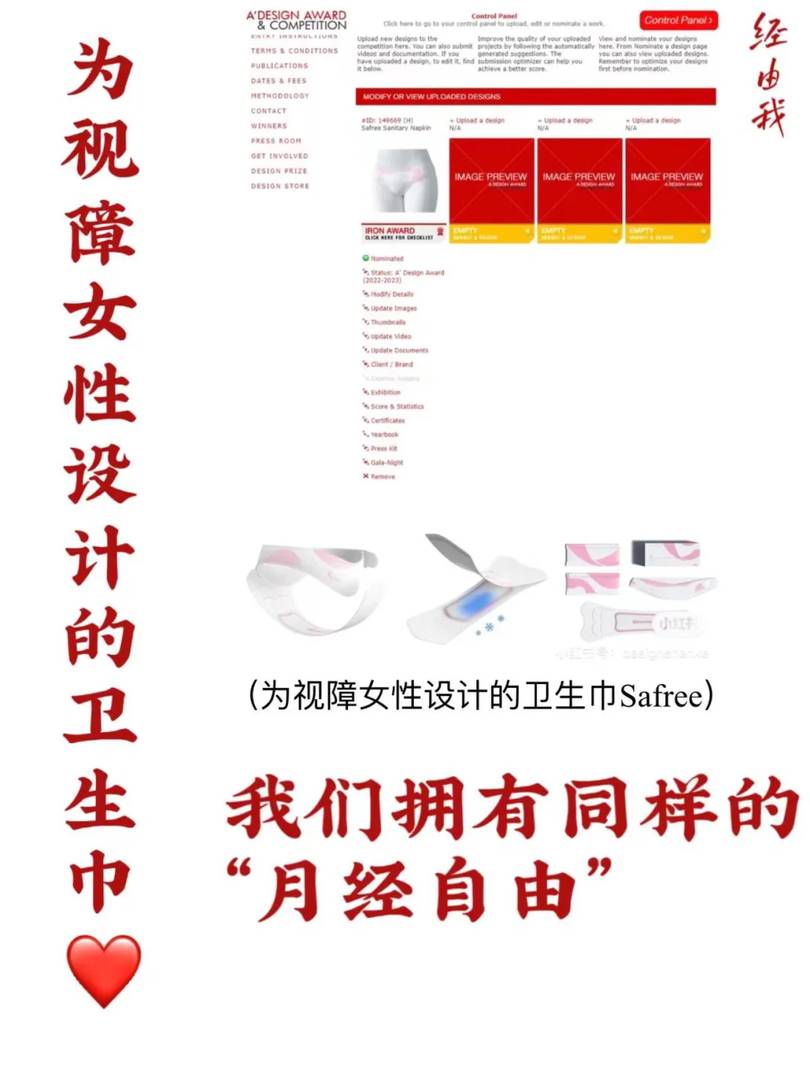
3⃣ Public discomfort – They gauge pad status through wear duration and weight changes. Period-related awkwardness affects all women equally.
4⃣ Infrequent changes – While increasing health risks, this likely results from socioeconomic factors like poverty or light flow, not visual impairment.
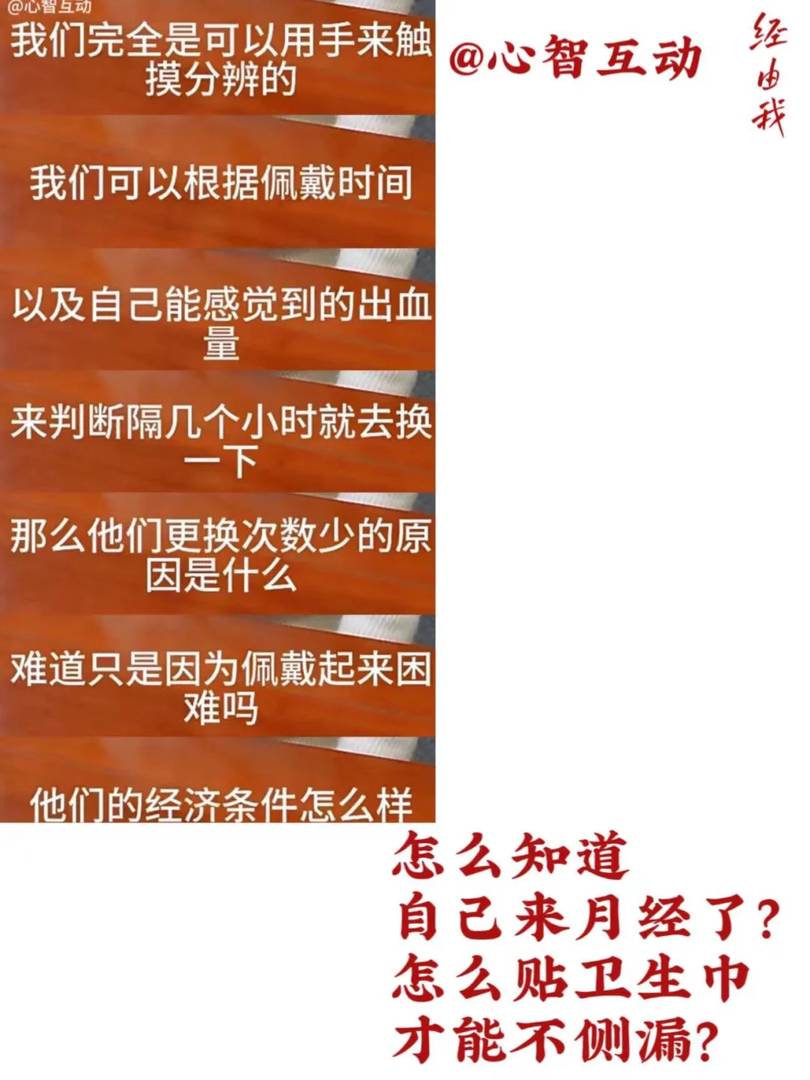
🚺 True challenges exist: identifying brands, materials, and sizes remains difficult without braille labeling. Encouragingly, several brands have pledged to add braille to packaging soon.
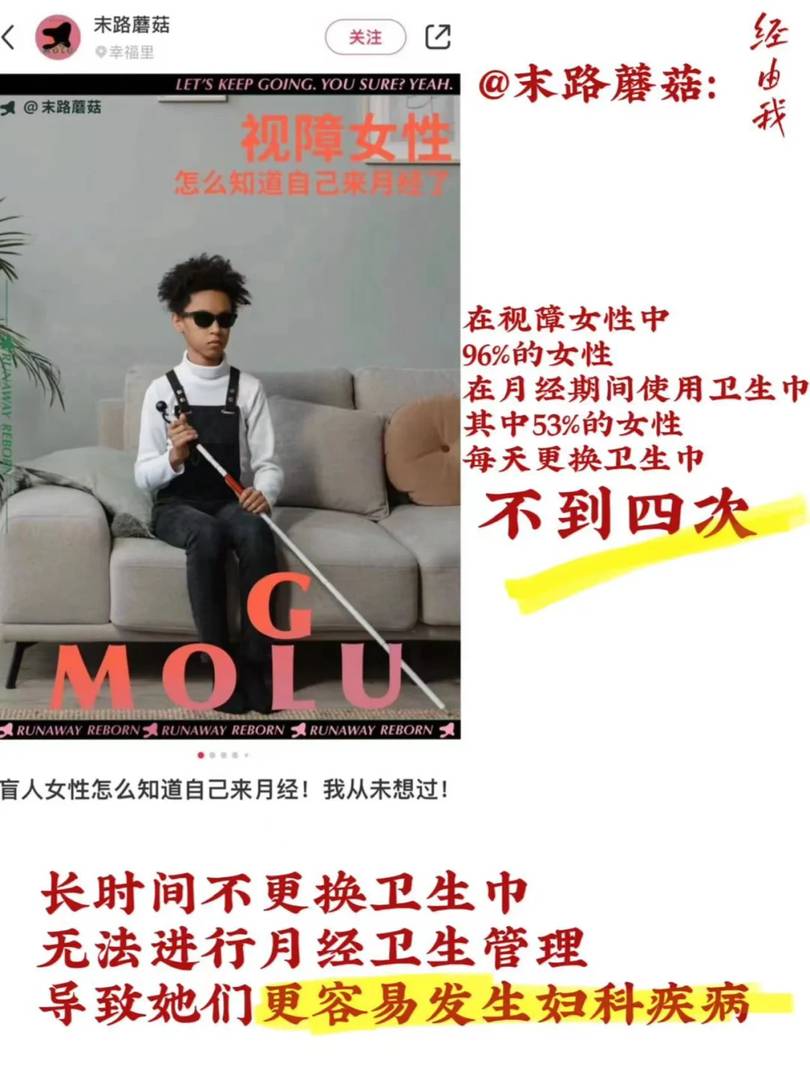
💗 Beyond pads, visually impaired women have expanding options: tampons, menstrual cups, and period underwear offer alternatives.
🤖 A significant limitation persists: inability to monitor blood color for health assessment. This mirrors other daily challenges awaiting smart tech solutions.
📄 Biological differences emerge: chronic darkness affects melatonin production, potentially altering average menarche age and period symptoms compared to sighted women. Targeted menstrual education becomes crucial.
👩 Other disabled women face unique hurdles: those with mobility impairments struggle with pad changes. Could single-hand operable pad designs help? These pressing questions demand solutions.
This is such an eye-opening topic. It’s shocking to learn about the challenges blind women face with menstrual hygiene and accessibility. I wonder if there are any ongoing efforts to develop braille-labeled products or better educational resources for them.
Thank you for your thoughtful question! Yes, there are indeed initiatives to create braille-labeled products and improve educational resources for blind women. It’s a vital step toward ensuring inclusivity and empowerment. I’m hopeful these efforts will continue to grow and make a meaningful difference.
This is such an important topic that doesn’t get enough attention. It’s shocking to hear about the challenges they face with hygiene and accessibility during their periods. I wonder if there are any potential solutions or innovations in the works to help these women. It’s incredible how many small things we take for granted in our daily lives.
Thank you for your insightful comment! You’re right—there are indeed efforts to address these challenges, like developing more accessible period products and improving public infrastructure to be more inclusive. It’s inspiring to see organizations working on innovative solutions. I completely agree that it’s eye-opening to realize how many everyday conveniences we often overlook.
This is such an eye-opening topic. It’s shocking to learn about the lack of accessible solutions for blind women dealing with menstruation. I wonder what kind of innovations could help address these challenges.
Thank you for your insightful comment! Innovations like braille instructions on period products or voice-guided apps could make a big difference. It’s inspiring to see people like you thinking about solutions. Thank you for engaging with this important topic!
This is such an eye-opening topic. I never thought about how challenging it must be for visually impaired women to manage their periods without clear labels or accessible products. It’s really important to raise awareness about these accessibility issues. We need more inclusive solutions for everyone!
Thank you for sharing your thoughts! You’re absolutely right—raising awareness is key to driving change. It’s inspiring to see people like you care about making the world more inclusive. I completely agree that we need innovative, accessible solutions for all!
This is such an eye-opening topic. It never occurred to me how difficult it must be for visually impaired women to manage their periods without accessible products. I wonder if there are any grassroots efforts to develop solutions for this issue. It feels like such a neglected area of accessibility.
This is such an eye-opening topic. It’s crazy to think about how something as basic as managing periods can be so complicated when accessibility isn’t considered. I had no idea that lack of braille labeling could make it this difficult. This really highlights the need for more inclusive products.
This is such an eye-opening topic. I had no idea how challenging it is for visually impaired women to manage their periods. It’s really important to raise awareness about accessibility issues like this. We need more inclusive solutions, like braille labels on products.
Thank you for sharing your thoughts! You’re absolutely right—raising awareness is crucial, and inclusive solutions like braille labels can make a huge difference. It’s inspiring to see people like you advocating for change. Let’s keep the conversation going and work toward a more accessible future together!
This is such an important topic that doesn’t get enough attention. It’s crazy to think about how many barriers exist even with something as basic as managing your period. I wonder if there are any grassroots efforts or startups working on solutions for this. This really puts into perspective how much we take for granted when it comes to accessibility.
This is such an important topic that doesn’t get enough attention. It’s crazy to think about how something as basic as tracking your period becomes so complicated when you can’t see. I wonder if there are any simple solutions that could help make pads more accessible for visually impaired women.
This is such an important topic that doesn’t get enough attention. It’s shocking to hear about the hygiene challenges blind women face during their periods. I had no idea that braille-labeled pads don’t even exist. There definitely needs to be more awareness and solutions for this issue.
This is such an eye-opening topic. I never thought about how difficult it must be for visually impaired women to manage their periods. It’s really important that we raise awareness about accessibility issues like this. Braille labeling on sanitary products could make a big difference.
Absolutely, raising awareness is key to driving change. Braille labeling is a fantastic idea and could significantly improve independence for visually impaired women. Thank you for sharing your thoughts—it’s inspiring to see people care about inclusivity. Let’s keep the conversation going!
This is such an eye-opening topic. I had never thought about how challenging it must be for visually impaired women to manage their periods. It’s alarming that so many face hygiene issues due to lack of accessible products. Braille labeling on pads would make a huge difference!
Thank you for your insightful comment! You’re absolutely right—accessible period products can make a significant impact. Adding braille labels is a simple yet powerful solution that could greatly improve the lives of visually impaired women. I’m glad this article sparked awareness and conversation!
This is such an eye-opening topic. It’s shocking to learn about the challenges blind women face with menstrual hygiene and accessibility. I wonder if there are any potential solutions or innovations in the works to help address these issues.
This is such an important topic that doesn’t get enough attention. It’s shocking to hear about the challenges they face with hygiene and accessibility during their periods. I wonder if there are any organizations working on creating more inclusive products for visually impaired women. This really highlights the need for better education and resources around menstruation for all women, regardless of ability.
Thank you for bringing up this crucial issue! There are actually several organizations focused on creating inclusive menstrual products for visually impaired women, like Period International and certain local initiatives. Your point about education and resources is spot-on—raising awareness can make a huge difference. I’m grateful for your insights and hope this sparks more conversations on inclusivity!
This is such an eye-opening topic. It’s heartbreaking to hear about the challenges blind women face with menstrual hygiene and accessibility. I had never thought about how difficult it must be to manage something so private without being able to see. We really need more inclusive solutions for all women, regardless of ability.
Thank you for sharing your thoughts—it’s inspiring to see people recognizing these important issues. You’re absolutely right; there’s a critical need for more inclusive products and resources for all women. I hope this article sparks conversations that lead to positive change. Thank you for engaging with such a vital topic!
This is such an eye-opening topic. It’s shocking to learn about the lack of accessible solutions for visually impaired women during their periods. I wonder what kind of innovations could help address these challenges. It feels like there’s so much room for improvement in making menstrual products more inclusive.
Thank you for your thoughtful comment! You’re absolutely right—there are many opportunities to innovate and make menstrual products more accessible. Some ideas include tactile indicators on packaging or developing reusable products with clear audio instructions. It’s inspiring to see people like you thinking critically about inclusivity!
This is such an important topic that doesn’t get enough attention. It’s crazy to think about how many barriers exist even with something as basic as managing your period when you’re blind. I wonder if there are any simple solutions being developed to help these women. It just highlights how much we take for granted in our daily lives.
Wow, I never realized how difficult managing periods must be without visual cues. The lack of braille-labeled pads is shocking – this seems like such a basic accessibility need that should’ve been addressed already. Really makes you think about all the little things sighted people take for granted.
Wow, I had no idea blind women faced so many practical hurdles with menstruation. The lack of braille on pads is shocking – how has this basic accessibility issue been overlooked for so long? This really makes me rethink how many daily things we take for granted.
Wow, I never realized how difficult managing periods could be for blind women. The lack of braille-labeled pads is such a basic accessibility oversight that needs urgent attention. This really opened my eyes to an issue most people never think about.
Thank you for your thoughtful comment—it’s heartening to see readers engaging with this important issue. I completely agree that braille labeling is a simple yet overlooked solution that could make a huge difference. It’s conversations like these that help drive awareness and change, so we really appreciate you adding your voice!
I had no idea that braille-labeled pads aren’t even available – that’s such a basic accessibility issue that’s completely overlooked. These statistics about pad changing frequency are really concerning for their health. We definitely need more innovation in menstrual products for the visually impaired community.